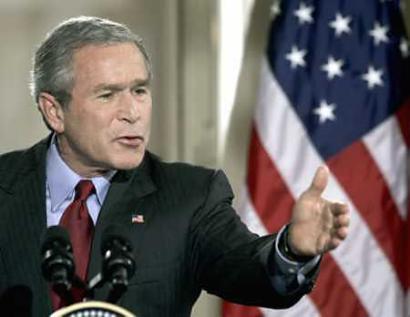
In considering George W. Bush’s legacy, I would suggest that Bush flamboyantly hastened America’s global decline — a decline that might have otherwise been stretched out over many decades and happened anyway.
Bush sped up history and punctured America’s mystique as a superpower by showing key fundamental limits. Being a superpower is more spin and more sleight-of-hand than real. The rest of the world has to believe that a superpower has few constraints and can tackle nearly any problem. Once limits became exposed, allies counted on America less and foes pushed their agendas forward.
On top of over-stretching the US military, Bush oversaw a government that allowed toxic financial products to be injected intravenously into the global financial system — thus robbing America of any status as the finest manifestation of near perfect capitalism. I didn’t believe that the US has been anywhere near a well performing economy for some time — but my view and that of many other working middle class Americans has been insufficient to pry the hands of Bob Rubin and his Wall Street self-dealers off the levers of the government’s economic machinery.
Bush has undermined America’s trust in its institutions and values by promulgating torture, domestic spying, extraordinary rendition, secret prisons, and fabricated truths and wars. The scars of these sins won’t easily be heeled or easily reversed for many years.
Dan Froomkin of The Washington Post has a very compelling assessment of Bush’s legacy — and then a long compilation of other comments from political observers worth reading.
A clip from Froomkin:
Here is Bush’s legacy, in part:
He took the nation to a war of choice under false pretenses — and left troops in harm’s way on two fields of battle. He embraced torture as an interrogation tactic and turned the world’s champion of human dignity into an outlaw nation and international pariah. He watched with detachment as a major American city went under water. He was ostensibly at the helm as the worst financial crisis since the Great Depression took hold. He went from being the most popular to the most disappointing president, having squandered a unique opportunity to unite the country and even the world behind a shared agenda after Sept. 11. He set a new precedent for avoiding the general public in favor of screened audiences and seemed to occupy an alternate reality. He took his own political party from seeming permanent majority status to where it is today. And he deliberately politicized the federal government, circumvented the traditional policymaking process, ignored expert advice and suppressed dissent, leaving behind a broken government.
ad_icon
Bush’s great hope is that Iraq in the years to come will emerge as a thriving pro-Western democracy — and offer some vindication for the misbegotten war that will always be associated with his name. (He has already done a masterful job of spinning his troop “surge” as a profound success — instead of a maneuver that has simply postponed the nearly inevitable paroxysms to come.) But even if he does ultimately have something to show for our incredible — and profoundly mismanaged — investment of blood and capital, it will never be enough.
It does disturb me that Obama sees it as necessary to sit down and break bread with some of the nation’s opinion leaders who were proponents of and cheerleaders for all of the destructive policy decisions that harmed the United States under the direction of George W. Bush.
Obama reportedly dined at the home of George Will along with Charles Krauthammer, William Kristol and David Brooks.
Despite what may happen in coming days in Obama’s Inaugural festivities, I can hear and sense the excitement seeping out of America’s and the world’s Obama bubble.
— Steve Clemons


60 comments on “Bush’s Legacy”